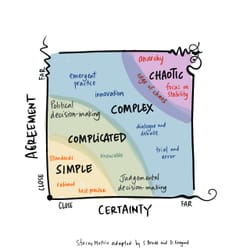Debugging. Well, it's not exactly the most shiny side of programming, is it? No boot camp is advertising with "Learn programming from us, so you could debug an app in just a week!". Usually there’s no standing ovation when you fix a bug that’s been introduced in development and wasn't even shipped to production yet. No applause when you find and fix that particular case, that wrong condition, proxy server, or whatever else. But for some of us there’s a weird satisfaction in playing the role of detective in the world of code.
Yep, I think debugging is quite fun and I even like it.
Debugging: A Scene Out of a Detective Novel
Picture this: You’re at your desk. Surrounded by thousands of log lines, error messages are screaming at you in red, and your application feels more like an uncooperative witness (maybe even a little insane one), rather than a piece of software. Debugging is a lot like stepping into a classic detective novel, but instead of suspects, you’ve got variables, servers, and conditions.
The process starts with clues. Logs are your eyewitnesses—details that might help paint the picture of what went wrong. Stack traces? They’re your cryptic maps, pointing you to a general area but rarely giving you a precise location. Variables are your suspects, their values shifting under interrogation as you step through the code. Sometimes they’re guilty, sometimes they’re just in the wrong place at the wrong time. And the conditions? Oh, they’re the plot twist no one saw coming.
You start reading code lines, one after another. A variable isn’t what you expected? Trace its journey. A function is misbehaving? Step through it line by line. The logs aren’t clear? Add more, add classic "I'M HERE" everywhere, and run the case again. It’s a game of cause and effect, of “changing stuff and seeing what happens” scenarios, until finally, you land on the culprit. Sometimes it’s a simple fix— flip a boolean, wrong operator, missed validation. Other times, it’s deeper: a misconfigured server or policy, an unexpected edge case, or something hidden in third-party site. It's not rare when you get totally stuck and have to take a step back with a broader picture in mind. You spend hours, days, weeks, finding the murderer in this detective novel.
The Employer’s Perspective: Why Is It Taking So Long?
From the outside looking in, debugging can seem... inefficient, to say the least. Time goes by, and there’s no new features, no visible progress, just you, head down, running tests and checking logs again and again and again. For employers or managers focused on Jira metrics and deadlines, it’s natural to wonder: Why is this taking so long? No, your programmers are not dumb or slacking. Debugging takes time.
Debugging isn’t just about fixing the immediate issue. Sure, the end goal is to fix the bug, but the journey to get there is what really matters (not poetically) and takes most of the time. Almost every debug session is an exploration, especially in a large project. You’re learning how the system behaves under different conditions, uncovering edge cases, and gaining insights into the codebase’s strengths and weaknesses. It’s like diagnosing an illness. The symptoms give you hints, but you need to dig deeper into the system to understand the underlying cause and prescribe the right fix.
What might look like “wasted time” is actually an investment. The knowledge gained during debugging doesn’t just makes today’s problem go away — it prepares the team for tomorrow’s challenges. It uncovers flaws in the code or infrastructure before they become major issues and ensures that the software is well-written and will handle or avoid similar problems in the future.
I get it. Time is a valuable resource, and debugging doesn’t always feel like forward momentum. Sometimes I even feel guilty during daily stand-ups: days go by and for n-th day in a row I'm saying the same thing - "Yep, I'm still on this bug." But I think I'm right: it’s better to spend time solving problems now than dealing with a production outage or business stopping behavior later.
Why Debugging Is Actually Fun (For me, at least)
As I said - I quite enjoy debugging. I know, — some of you already facepalmed so hard your face hurts. But wait, hear me out. Obviously, not always, but there’s a weird kind of enjoyment in taming the chaos. You start with a mess—a broken feature, an unrelated error message, or worse, silence — and end with a solution. It’s like solving a mystery, except the culprit isn’t some sketchy figure in a trench coat; most likely it’s you or other member of a team from three months ago. But it's not the fix that brings joy: once you know what to do - it's easy. It's finding the cause, the process of tracing the symptom up to it's origin, bringing these puzzle pieces together - that's what I like about this process.
Debugging forces you to slow down and think. It’s not about rushing to a solution; it’s about understanding the problem. And when you finally solve it? Feels good.
Of course, not everyone shares this enthusiasm. For some, debugging is a chore—a hateful blocker in the way of writing new exciting code and baking features. And that’s fine. Every developer has their preferences. But for those of us who likes solving puzzles, debugging is where the magic happens, when you feel like a detective on a case.
So What Now?
Soooo, the outcome, I guess:
- Code with empathy. Think about the developer (maybe even future you) who will have to debug your work. No, you won't remember a thing. Leave clues— meaningful variable names, good logging and structure, make it readable.
- Be patient. The problem isn’t always where it seems. Sometimes you have to dig deeper, question your assumptions, grab a colleague and follow the trail wherever it leads.
- It's a CV hack. Weirdly enough, when I'm being asked, "how do you feel about fixing bugs in this huge app written 5 years ago" and they hear "I like it and I'm good at it" — it's a powerful point. They raise their eyebrow, but still I get a respect point.
You're a Detective, Harry
Debugging isn’t just a task on your to-do list; it’s a skill. It’s a mindset. And yes, sometimes, it can be fun. So the next time you find yourself with a huge log file, tracking down an elusive bug, remember: you’re not just a developer. You’re a detective, solving this case.
You've most likely have heard of a "Rubber duck debugging"; I also suggest "Debugging fedora", lol.







